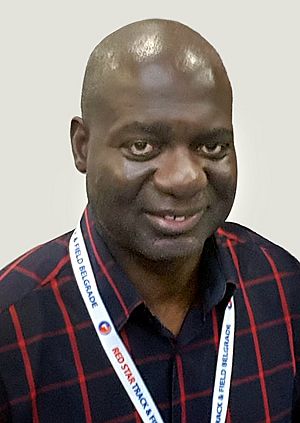Ben Johnson (Canadian sprinter) facts for kids

Johnson in 2017
|
|||||||||||||||||||||||||||||||||||||||||||||||||||||||||||||||||||||||||||||||||||||||||
| Personal information | |||||||||||||||||||||||||||||||||||||||||||||||||||||||||||||||||||||||||||||||||||||||||
|---|---|---|---|---|---|---|---|---|---|---|---|---|---|---|---|---|---|---|---|---|---|---|---|---|---|---|---|---|---|---|---|---|---|---|---|---|---|---|---|---|---|---|---|---|---|---|---|---|---|---|---|---|---|---|---|---|---|---|---|---|---|---|---|---|---|---|---|---|---|---|---|---|---|---|---|---|---|---|---|---|---|---|---|---|---|---|---|---|---|
| Full name | Benjamin Sinclair Johnson, Jr. | ||||||||||||||||||||||||||||||||||||||||||||||||||||||||||||||||||||||||||||||||||||||||
| Born | December 30, 1961 Falmouth, Trelawny Parish, Jamaica |
||||||||||||||||||||||||||||||||||||||||||||||||||||||||||||||||||||||||||||||||||||||||
| Weight | 75 kg (165 lb) | ||||||||||||||||||||||||||||||||||||||||||||||||||||||||||||||||||||||||||||||||||||||||
| Sport | |||||||||||||||||||||||||||||||||||||||||||||||||||||||||||||||||||||||||||||||||||||||||
| Country | |||||||||||||||||||||||||||||||||||||||||||||||||||||||||||||||||||||||||||||||||||||||||
| Event(s) | 60 m, 100 m, 200 m | ||||||||||||||||||||||||||||||||||||||||||||||||||||||||||||||||||||||||||||||||||||||||
| Achievements and titles | |||||||||||||||||||||||||||||||||||||||||||||||||||||||||||||||||||||||||||||||||||||||||
| Personal best(s) | 30 m: 4.40 (2006) 50 m: 5.69 (1984) 55 m: 6.05 (1986) 60 m: 6.50 (1986) 100 m: 9.95 (1986) 200 m: 20.41 (1985) |
||||||||||||||||||||||||||||||||||||||||||||||||||||||||||||||||||||||||||||||||||||||||
|
Medal record
|
|||||||||||||||||||||||||||||||||||||||||||||||||||||||||||||||||||||||||||||||||||||||||
Benjamin Sinclair "Ben" Johnson (born December 30, 1961) is a Canadian former sprinter. For a short time, he was known as the world's fastest man. He set world records in the 100-meter and 60-meter races.
Johnson won a gold medal in the 100-meter race at the 1988 Summer Olympics. However, he was later disqualified for breaking anti-doping rules. This meant he had to give back his medal. He also won two bronze medals at the 1984 Summer Olympics.
Contents
Early Life and Career
Ben Johnson was born in Falmouth, Jamaica. In 1976, he moved to Canada with his family. He grew up in a neighborhood of Toronto.
Johnson started training with coach Charlie Francis at a track and field club at York University. Francis was a former Canadian sprinting champion himself. He saw Johnson's potential and helped him become a top athlete.
Johnson's first big success was at the 1982 Commonwealth Games in Australia. He won two silver medals in the 100-meter race and the 4 × 100-meter relay. At the 1984 Summer Olympics in Los Angeles, he won a bronze medal in the 100-meter final. He also won a bronze with the Canadian 4 × 100-meter relay team. By the end of 1984, he was Canada's best sprinter.
Rise to Fame and World Records
In 1985, Johnson began to beat his main rival, American sprinter Carl Lewis. He won against Lewis at the 1986 Goodwill Games. In 1987, at the World Championships in Rome, Johnson became world famous. He won the 100-meter race and set a new world record of 9.83 seconds. This was a huge achievement and made him a star.
After this victory, Johnson became very popular. He earned a lot of money from endorsements and won many awards in Canada. He was named a Member of the Order of Canada for being "the world's fastest human being."
Rivalry with Carl Lewis
The races between Ben Johnson and Carl Lewis were very exciting for sports fans. Lewis had been the top sprinter for years. When Johnson started winning, it created a famous rivalry.
After Johnson won in Rome, Lewis suggested that some athletes were using banned substances to win. This started a public debate about fairness in sports. Johnson and Lewis were set to race against each other again at the next Olympic Games.
The 1988 Seoul Olympics
The Race and Disqualification
On September 24, 1988, at the Summer Olympics in Seoul, South Korea, Johnson ran the race of his life. He won the 100-meter final in 9.79 seconds, breaking his own world record. He became the first Canadian to win the Olympic 100-meter race since 1928.
However, three days later, everything changed. Officials announced that Johnson's drug test after the race had found a banned substance called stanozolol. Using such substances, known as steroids, is against the rules of sports because it gives an unfair advantage. As a result, Johnson was disqualified. His gold medal was taken away, and his world record was erased. He later admitted to using steroids for his 1987 world record, so that record was also taken away.
How Canada Reacted
At first, Canadians were extremely proud of Johnson's victory. The Prime Minister of Canada, Brian Mulroney, even called to congratulate him. Newspapers celebrated his amazing achievement.
When the news of the disqualification came out, people in Canada were shocked and disappointed. The story was front-page news for many days. The event was a huge moment in Canadian sports history, showing how a hero could fall from glory very quickly.
The Dubin Inquiry
After the scandal, the Canadian government started a major investigation called the Dubin inquiry. It looked into the use of banned substances in sports. Johnson testified and admitted that he had been using steroids for years. The inquiry revealed that the problem was widespread among many athletes, not just Johnson.
Life After the Scandal
In 1991, after his suspension ended, Johnson tried to make a comeback. He competed again but was not as successful as before. He made it to the 1992 Summer Olympics but did not reach the final. In 1993, he failed another drug test and was banned from competing for life by the IAAF.
In his later years, Johnson has worked as a coach and has spent time with his family. In 2010, he wrote a book about his life called Seoul to Soul. He has also appeared in documentaries about his career and the famous 1988 race. A TV miniseries about his life, Hate The Player: The Ben Johnson Story, was ordered in 2025.
See also
 In Spanish: Ben Johnson (atleta) para niños
In Spanish: Ben Johnson (atleta) para niños
- List of doping cases in athletics
- Men's 100 metres world record progression
 | Audre Lorde |
 | John Berry Meachum |
 | Ferdinand Lee Barnett |

